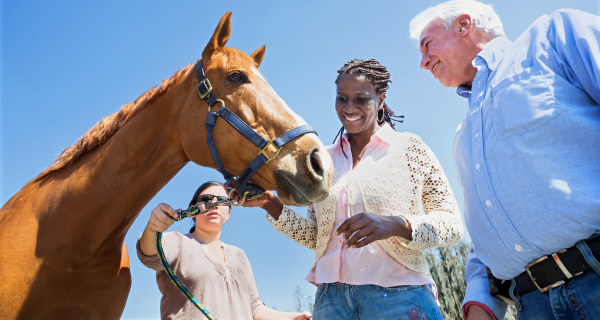
Article supplied by the RSPCA Australia
www.rspca.com.au
As published in The Pet Directory
Owning a horse is a huge responsibility. It means hard work and dirty chores for a long time, and it also means quite a considerable expense.

It is very important for a prospective horse owner to understand that the initial purchase of a horse is only the first step and many more costs will be involved. Some of the basic necessities you will need for your horse include a bridle, saddle, saddle blanket, grooming brush, feed tin and water container. You are advised to enquire about the costs of such items first as they can be very expensive unless you take time and care in their selection. Also needed is a safe storage area for your equipment when it is not in use.
Your own riding outfit has to be purchased as well, and this must include a suitable hard hat and good quality riding boots. There will also be veterinary fees and farrier fees, not to mention stabling costs and the cost of feed.
Before you purchase a horse please ensure that you have thought carefully about the responsibility of horse ownership. Speak to your local veterinarian, pony club and other horse owners, and gather as much information as you can to aid you in your decision. Never buy a horse as an impulsive decision. The following information is intended to provide a very basic overview of the essentials of caring for your pet. It does not cover every aspect of the care of your pet and we strongly advise that you seek further specific information and advice in order to ensure the welfare of any animals in your care.
Responsibility of Horse Ownership

All horses have certain basic needs irrespective of the husbandry system under which they are kept. As a responsible horse owner you must provide:
• Readily accessible food and fresh water to maintain health and vigour;
• Freedom of movement to stand, stretch and lie down;
• Regular exercise;
• Social contact with other horses and people;
• Accommodation that neither harms nor causes undue strain, and provides adequate protection;
• Protection from disease and regular inspection to assess the need for attention to feet, teeth and worm control;
• Rapid identification and treatment of sickness, injury and disease.
If a horse is provided with clean water, proper food, good shelter, parasite control, vaccination, vet and dental care, proper exercise and company, it can be a happy and responsive companion which will give you many years of pleasure and loyalty.

Choosing A Horse
It is important to buy your horse from a reputable source. Beware of purchasing a horse from markets, dealers, or persons who cannot provide a satisfactory history of the animal.
Make sure the vendor knows for what purpose you wish to use the horse. It is important that you and your horse are well-matched so great care and time should be employed in its selection:
• Find out all about it: age, background and any vices such as behavioural or health problems. In particular ask whether it is good in traffic and what level of experience the rider will need to ride it.
• Examine the horse and have an experienced friend ride it for you;
• Ride it yourself. If it feels right ask for a one week trial, then ride and handle the horse daily;
• Have your own veterinary surgeon check the horse for fitness and suitability prior to purchase.
Basic Horse Needs
Paddock

A horse should have access to a paddock of around three acres, which should have some natural shelter, good grass cover and adequate drainage.
The paddock should be:
• Properly fenced (not barbed wire) and free from all rubbish and debris; especially old wire and iron;
• Close enough to home to permit daily visits;
• A minimum of three acres as a rough guide.
Shelter

Horses need shelter from extremes of weather including temperature, wind and rain. Natural shelter such as a group of trees or a hedge is good. A shed or stable may either supplement or substitute natural shelter. Old horses need special care and should have a warm waterproof rug in winter in addition to other protection from the elements, although care must be taken to avoid overheating when temperatures rise.
Nutrition

Depending on the level of work and exercise you are giving your horse, you may need to supply supplementary feeding to maintain body condition. When good pasture is available and your horse is not ridden regularly, there is probably no need for supplementary feeding. Whilst it is not acceptable for your horse to be too thin, overfeeding is a common problem and many horses are too fat. When pasture declines, that is, when there is little grass available, supplementary feeding will be required to maintain bodyweight. Good quality lucerne or legume/grass hay is adequate for adult horses which are idle or ridden infrequently. Pelleted rations and concentrate feeds may be more suitable if grass is plentiful but of poor quality or your horse is getting a lot of work or exercise. Young growing animals, lactating mares and hard working horses require more energy. This can be supplied by feeding concentrate supplements such as grain or a complete pellet.
Water

Horses may drink as much as 45 litres of water or more per day, especially if they are being ridden or are working. It is essential that a horse has access to a constant supply of fresh, clean water at all times.
Horse Health
Preventative Care

Routine grooming, exercise, hoof care, nutrition and environmental housekeeping are key steps in maintaining the health of your horse. Horses are, by nature, social animals and interaction and company from other horses will ensure their mental well-being.
Veterinary checks are important for general maintenance, but especially if you suspect illness or injury. If you suspect a problem with your horse’s health you must contact a veterinarian immediately.

Teeth

Equine teeth are designed to keep growing and changing throughout a horse’s life, but if they do not wear properly in the process, they can cause the horse pain, illness and malnutrition.
Horses should have their teeth checked once a year particularly after reaching the age of four. If your horse has problems you should discuss them with your veterinarian and arrange for him to examine your horse.
Hooves

Your horse’s feet are of paramount importance to its health and overall comfort. A horse’s foot has three parts:
• Wall: this is the part you see when the foot is on the ground;
• Sole: this protects the foot from injury from below. It isn’t very thick and riding over stones will cause lameness due to bruising of the sole;
• Frog: this is important in pumping blood back up the leg.
Regular care and attention is essential when it comes to your horse’s feet. Hooves can become overgrown and packed with mud, manure and dirt. This may cause your horse excruciating pain. Every time a horse is handled its feet should be inspected for damage or soreness, and particularly for stones embedded in the frog.
A farrier will help maintain the health of your horse’s hooves by keeping them properly trimmed and shod. As a guide, horses that are ridden on roads or rough ground should be reshod every 6-8 weeks. Laminitis, a painful inflammation of the sensitive structures which line the inside of the wall of the foot, can be caused by excessive feeding and fast trotting on hard roads.
Colic

Colic in horses can be caused by a severe worm infestation, feeding irregularities, sudden diet changes, chronic indigestion or the ingestion of sand.
The signs of colic are unmistakable: general uneasiness, no interest in food, restless, looking around at the flanks, kicking at the belly, getting up and down and rolling. A horse with colic is an emergency and you should contact your veterinary surgeon immediately. While waiting for your vet to arrive you should keep your horse warm and walk it slowly.
Vaccinations

All horses should be vaccinated for tetanus and for some horses a vaccination for strangles is also advised. For further information please contact your veterinarian.
Deworming

Whilst it is virtually impossible to prevent your horse catching worms it is possible to keep the infestation under control by instituting a sound deworming programme. The frequency of deworming treatments will depend on where you live and the types of worms prevelant there. Horses will need to be wormed three to six times per year depending on paddock size and the stocking rate. Your veterinarian will be able to provide you will advice and a proper deworming schedule.


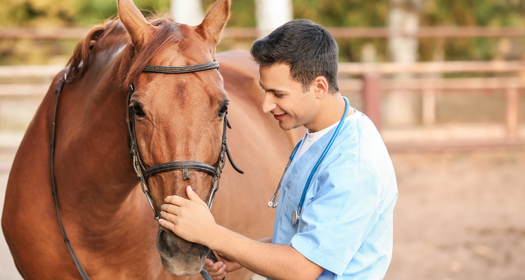
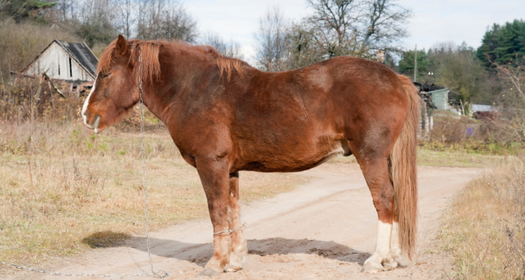
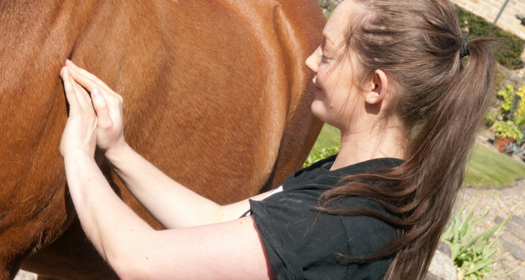
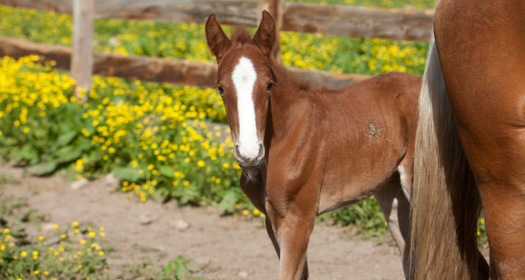
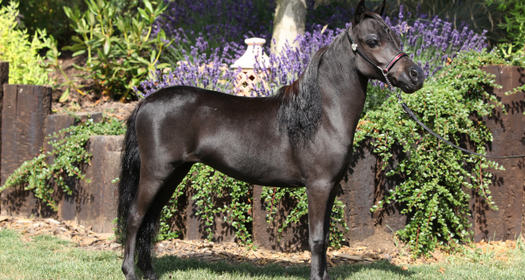



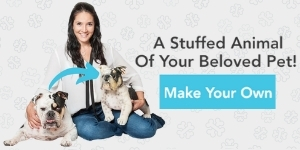
Leave Comment Below